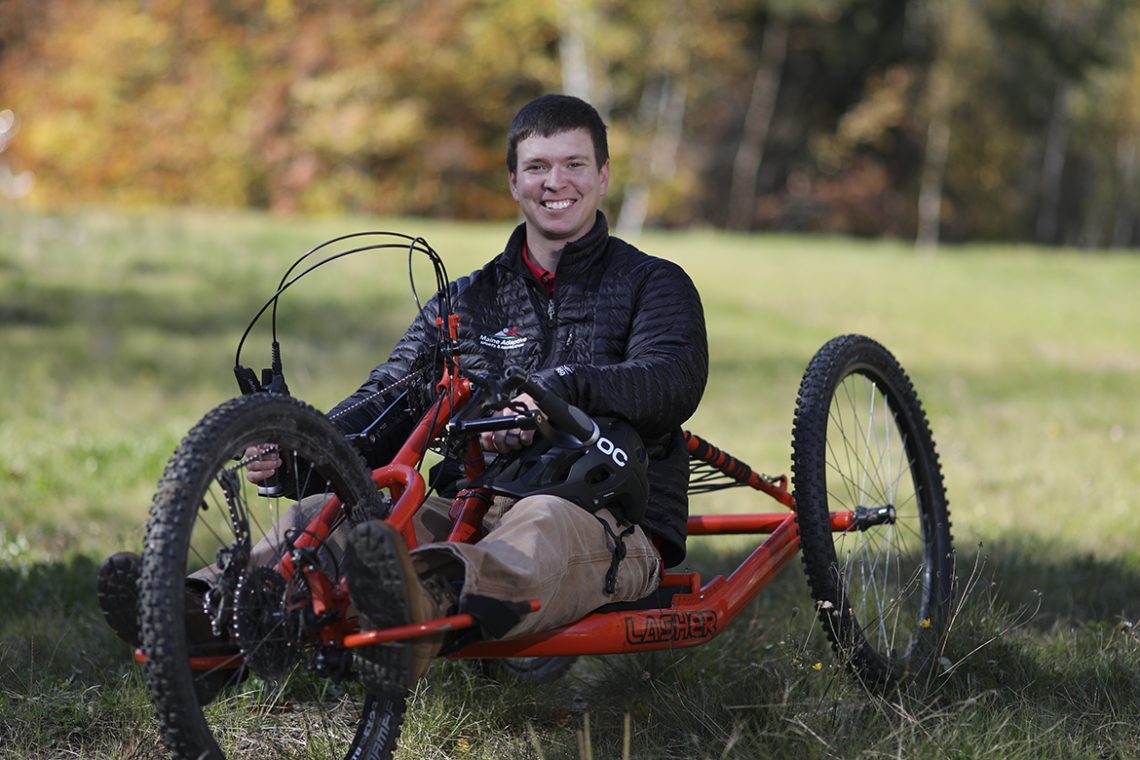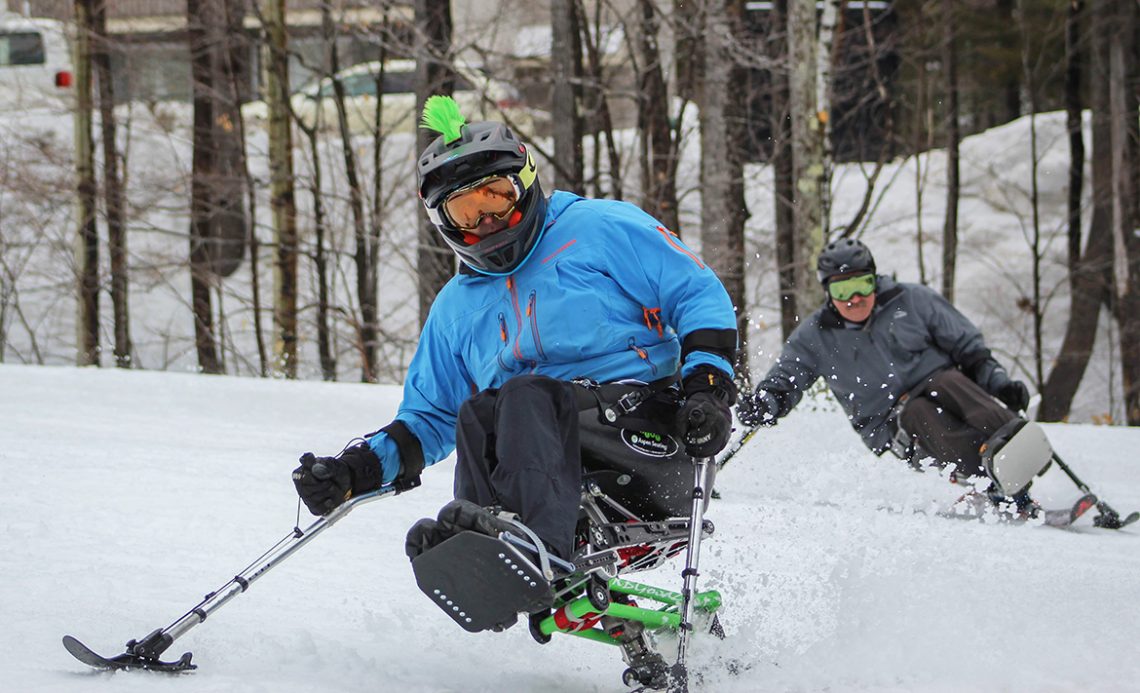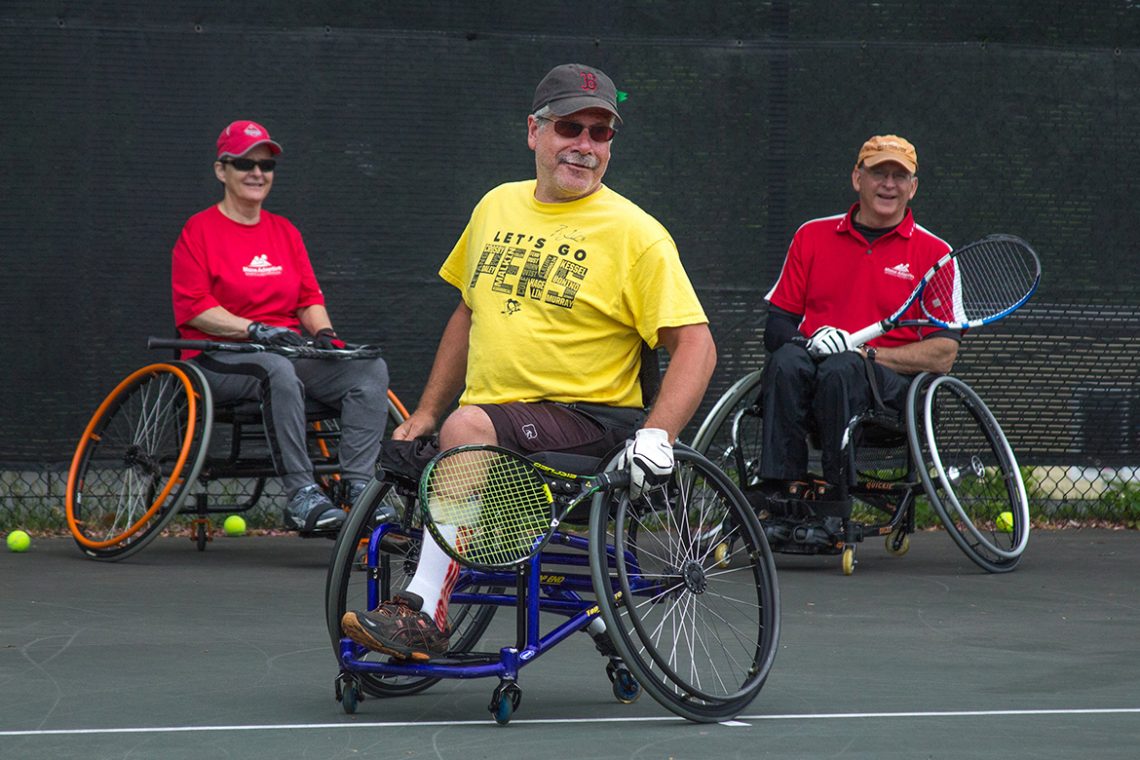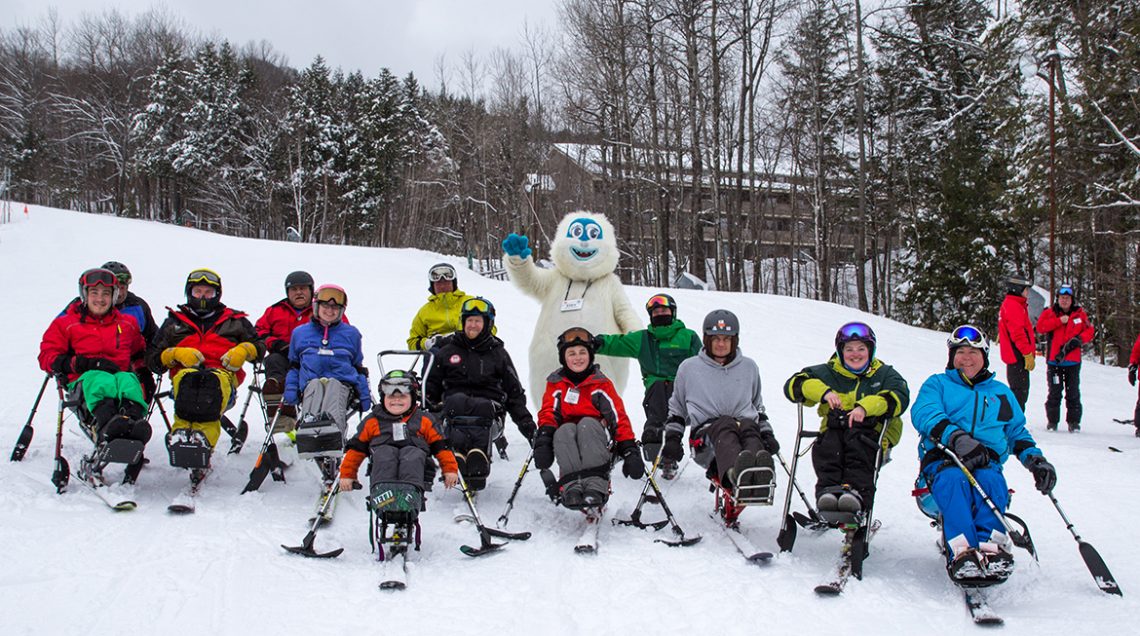Brandon Merry ’15, program manager at Maine Adaptive Sports & Recreation, helps people with disabilities find confidence, independence, and joy through outdoor activities.
By Marc Glass, November 2018
Like all Rehabilitation Services majors at Farmington, Brandon Merry ’15 gained an appreciation for the lived experience of disability through taking REH 110, Introduction to Disability Studies. Among other course requirements, he navigated campus in a wheelchair and later blindfolded to experience, firsthand, the challenges differently abled people face.
Little did he know then that the first-year course would be prove to be foundational to his work as program manager at Maine Adaptive Sports & Recreation in Newry, Maine, helping some 400 participants a year transcend cognitive and physical disabilities as they learn to ski, snowboard, bike, paddle, golf, play tennis, and climb.

Brandon Merry ’15, program manager at Maine Adaptive Sports & Recreation, rides an off-road hand-cycle, one of many pieces of adaptive equipment available for use at the nonprofit’s headquarters in Newry, Maine. (Photo by Marc Glass.)
“Whether it’s using hand-cycles, recumbent bikes, rock-climbing harnesses, all the different sit-skis, or learning to blind guide, I work to make sure I have an understanding of not only the gear, but also what the participants are dealing with on a daily basis,” says Merry. “I need to have that perspective myself in order to teach them and set them up for success.”
In this installment of the Q&A series “Ask Me Another,” Merry explains the satisfaction he derives from helping people develop confidence and independence, the professional connections he continues to forge with his alma mater, and what about his work at Maine Adaptive Sports & Recreation never fails to make him tear up.
For the uninitiated, what’s the population that you serve at Maine Adaptive Sports & Recreation, formerly known as Maine Handicapped Skiing?
“Maine Adaptive is a 501c3 nonprofit that provides adaptive instruction and equipment to people ages four and up with a range of cognitive and physical disabilities. Our participants could have developmental delays, PTSD, stroke, multiple-sclerosis, cerebral palsy, muscular dystrophy, limb loss, or traumatic brain injuries, to name a few. We are now all-inclusive when it comes to qualifying for our programs. We ski at both Sunday River and Sugarloaf, and provide programming throughout Maine during winter and summer.”
And what’s the overarching goal that you have for providing participants with free instruction in all the sports you teach?
“So our biggest goal as an organization is creating and enhancing independence. It’s not always necessarily about having fun, although that’s a close second. Each disability is going to define different levels of independence. So for one person that might be picking out the terrain that they’re going to ski or bike at a lesson. It might mean that they’re transferring in and out of their equipment all on their own or getting on and off the lift on their own or putting their ski boots on by themselves. Someone using a sit-ski might not be able to physically turn their ski themselves or control their speed, but they might be able to turn their head to indicate that they want to turn right, and then the instructor can help with the rest of that. That’s what we mean by helping everyone be as independent as possible.”

Maine Adaptive Sports & Recreation is located slopeside at Sunday River resort, enhancing access for participants who wish to learn to use adaptive ski and snowboard equipment. (Photo by Brandon Merry ’15.)
As Program Manager, what’s a key role you play with individual participants?
“With new participants, I first conduct an intake. This involves reviewing the individual’s physician statement to understand the disability from a medical perspective and talking with individuals to find out what sport or activity they’re looking to do with us. Then I discuss their goals with them and what they want to do and accomplish. A lot of that determines the adaptive equipment use and adapting the level of instruction to a person’s needs, as well as matching participants with instructors that are going to work well with that person individually. I need to make sure that when they do come for a lesson, regardless of that sport, that I have that equipment that they might need ready to go, because some people are coming from out of state or even out of the country, and I don’t want them to spend their time waiting for the gear to be set up. I need to make sure that everything is set aside ahead of time, before they even are confirmed for a lesson.”
Speaking of the gear, you have quite an array of it. Is it your job to be proficient in using all of it?
“Yes. I personally need to be at least proficient with every piece of equipment that Maine Adaptive has at our disposal. Even though some of our volunteer instructors have been with us for a long time, they do sometimes come to me and say, ‘Hey, this isn’t working out. What can I do?’ I need to be able to jump in with ideas and solutions. Part of my role is researching new equipment and finding out how acquiring that equipment might allow us to expand our capabilities for participants. Some of our newest equipment includes off-road hand-cycles and foot-cycles, as well as some two-wheel, regular mountain bikes that we were able to recently purchase with grants.”

Through engaging in adaptive sports, like wheelchair tennis, participants gain confidence, independence, and stronger sense of community, says Merry. (Photo by Brandon Merry ’15.)
How did you come to work at Maine Adaptive?
“It’s fairly personal for me. When I was growing up, my nana had diabetes and lost part of her leg due to diabetes. So I saw her go through the process of getting a prosthetic leg and go through PT and OT, and seeing her struggle in different areas. Some of those struggles came from not being outside and enjoying the outdoors. That experience started me in the direction of helping others. My parents were always avid volunteers in the community where my brother and I grew up. And then looking at college, I was kind of like, ‘Alright, well, how do I want to help people?’ So I looked at Rehabilitation Services at UMF, and it matched up with where I wanted to go. As each year went by, I was looking at narrowing the field of options. Up until the end of my junior year, I was looking at foster care and social work, and I had already had a job as a personal caregiver for a child with cerebral palsy that I was enjoying a lot. Then my advisor suggested Maine Adaptive for a practicum. They were actually looking for a practicum student and told me they had snowboard training the next day. So I brought my gear, kind of expecting it was going to be indoor training. I sat down, looked around and noticed that everybody had snow gear on, and thought, ‘OK, I guess I’m jumping right in.’ That first day, from day one, I was learning how to blind guide and how to tether a participant. Right away, I knew that that was something I wanted to do. I finished my practicum hours pretty quickly and then spent an additional 60 days with Maine Adaptive that winter. I was spending every minute that I could outside of class at Maine Adaptive, with sit-ski groups and blind guiding. I wanted to take in as much as possible. My whole focus was changing at that point. I spent a whole year, basically, trying to catch up and learn as much as I could about adaptive sports. Then they offered me a job at the end of the internship.

“Definitely the most satisfying part of my job is seeing people who thought they would never be able to do this in their life find joy,” says Merry. “That’s what keeps me going.” (Photo by Brandon Merry ’15.)
How are you strengthening the connection between Maine Adaptive and UMF?
“Since I started working here, Professor Karen Barrett ’91 in the Rehabilitation Services program has asked me to come in and do presentations with students to share what I do. That’s resulted in meeting and working with Scott Hoisington ’79 (Alpine Operations Coordinator and Skiing and Snow Sports Director) and others to develop internship opportunities for Rehabilitation Services majors and ORBA (Outdoor Recreation Business Administration) majors. Another exciting part of that is working with Scott and others to bring adaptive sports into the Farmington area. Scott has been working on creating these new accessible trails around the UMF athletic fields in Farmington. It’s really exciting, especially where we’re starting an adaptive mountain bike program that fits in very nicely with the new trail system that they’re building. In some of my recent visits to Farmington, I’ve brought adaptive equipment into classes so students can see how it works. It’s our hope to organize equipment demos for the public, both able-bodied people and people with disabilities, and also to continue to work on providing program opportunities at those trail systems that Scott is working on. It’s pretty exciting from my perspective to be able to come back to Farmington after a couple years and rejoin the community at UMF and Farmington, and help strengthen the community. That’s something that I take pride in — knowing that in the future this is going to become something pretty special.”
How can you see that Maine Adaptive is making a difference in participants’ lives?
“We see that on a daily basis. Sometimes through learning an activity they’re gaining social skills, new friends, or creating stronger sense of community that they might have not had prior to coming to us. And sometimes they’re enhancing their stamina and different strengths. Just by exercising more and enjoying the outdoors more, they become more motivated to do activities outside of Maine Adaptive. Developing confidence is a huge goal because a lot of people with disabilities historically have been told, ‘You can’t do this’ or ‘You won’t be able to do that.’ With us, the focus is on what you can do. Just because a person uses a wheelchair doesn’t mean they can’t bike, or ski, or go hiking. I’ve seen participants try a recumbent bike or a hand-cycle, and become proficient and independent. Then we help them find resources to get their own bike, and now they’re going on bike rides with family and friends for the first time, or they use biking as their means of transportation, and it extends their range of mobility. Once people experience greater independence through adaptive activities, they’re in a better position to begin to ask themselves how they can make adaptations to get around the house, get the mail, and get groceries. The skills that they learn here at Maine Adaptive can be adapted to all kinds of daily life skills.”
You mentioned that you grew up always enjoying outdoor activities and you enjoy getting to know and use the broad range of outdoor gear. What’s the most satisfying part of your work?
“The most satisfying part of my job is seeing people who thought they would never be able to do this in their life find joy. Sometimes it’s hearing the parent of a child that has the disability saying, ‘I never thought I would see my kid ride a bike.’ That’s what keeps me going. As you can see, I’m tearing up a bit, because that’s something that really… it’s a big part of why I do it.”

